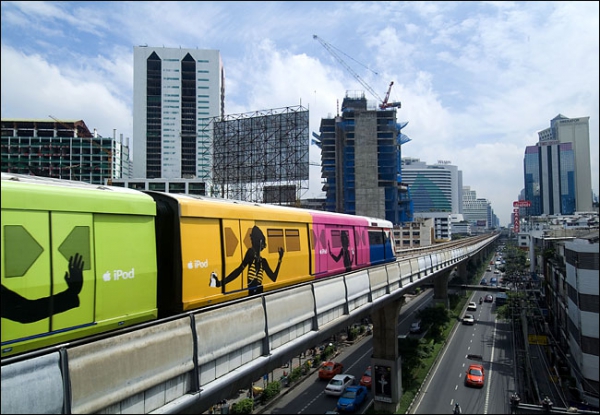A survey found that in some locations the cost of land had increased by more than 100% over the past three years.
For example, land from Ram Indra Road to Lad Phrao Road (Meng Jai junction), and located no more than a kilometre from the main road, now costs between Bt100,000 and Bt120,000 per square wah, double the Bt50,000-Bt60,000 that was being fetched back in 2010.
Thong Lor, which also has a limited land supply, has seen prices rise from an average of Bt700,000 per square wah five years ago to the current level of Bt1.3 million.
According to a survey by Century 21 (Thailand), land prices in locations close to the mass-transit system have increased by more than 100%.
The company's research shows that land on Sukhumvit Road located close to the BTS Skytrain has fetched Bt1.5 million per square wah, some 192% above the appraised value of Bt520,000 last July.
Asoke Road, meanwhile, has posted offer prices of Bt1.6 million per square wah, double the average achieved five years ago.
Provincial increases
And it is not only in Bangkok and its suburbs that land prices are rising, as major provinces - where a number of property firms are expanding their residential development - have also seen land prices rising by between 50 and 100 %, sometimes even more, over the last two years.
A survey by the Real Estate Information Centre of the Government Housing Bank shows that in in-demand Udon Thani province, for example, the cost of land has soared from between Bt5 million and Bt9 million per rai in 2011 to between Bt10 million and Bt12 million now.
The price of land located close to the beach in Hua Hin has doubled to Bt200,000 per square wah in the same time scale, while Khon Kaen prices have risen from an average of Bt80,000 per square wah to Bt200,000.
Meanwhile, the centre reports that Chiang Mai land prices have more than doubled in the past five years.
For example, plots averaging Bt20,000 per square wah on the Chiang Mai-Lampang Road in 2008 now fetch between Bt50,000 and Bt70,000 per square wah, with some even attracting Bt100,000.
SC Asset Corp chief operating officer Kree Dejchai said land prices in some greater Bangkok locations had risen to the extent that it was no longer feasible to develop one- or two-storey detached housing or townhouses, especially in the Ram Indra-Lad Phrao Road area.
Normally, this would mean that developers' attention is focused on condominiums, but this is not possible in the area as the new Bangkok city plan continues to categorise the location as a "low-density" area, meaning only low-rises can be developed.
As a result, most property firms active in the area have to develop three-or four-storey townhouses in order to make the most of the costly land, he said.
Kree said that while land prices were continuing to rise both in Bangkok and the provinces due to residential demand, they were being forced up even higher by limited supply, especially in locations close to the mass-transit system.
As a result, the cost of land in areas such as Sukhumvit tends to be even higher than the norm.
Meanwhile, the major property developers are acquiring more land in greater Bangkok, which has driven prices up further in a highly competitive environment, he added.
However, he believes rising land prices are the result of genuine demand among property firms wishing to develop residential projects, and are not down to any speculative activity aimed at boosting prices.
"Most of the land is held by property developers, who will develop it for residential purposes and do not need to sell in order to generate income from rising land prices. As a result, I believe this is real demand rather than speculation leading to a bubble, as in1997," he added.
Commercial development
Property Perfect CEO Chainid Ngowsirimanee said the demand for land was not only for the development of residential projects, as some firms had also bought plots in order to develop commercial buildings.
"We develop both commercial buildings and housing and need to acquire large plots, which are difficult to find. When we do buy something, we hold on to it and wait for the best time to develop mixed-used projects.
"This one of the reasons the market now faces a limited supply of land for developing both residential and commercial buildings, resulting in land prices doubling in some locations. This [the need to acquire more land] is in line with the country's economic growth and rising demand," he said.
Pruksa Real Estate chief business officer Prasert Taedullayasatit said that due to rising land prices, home-buyers would have to pay between 5 and 10% more for a new home, depending on the location.
"House prices increase every year, in line with the cost of developing residential projects. This includes the cost of land, construction raw materials, labour and energy. That is why home-buyers will always have to shoulder a higher cost if they delay the decision to purchase a home," he said.

